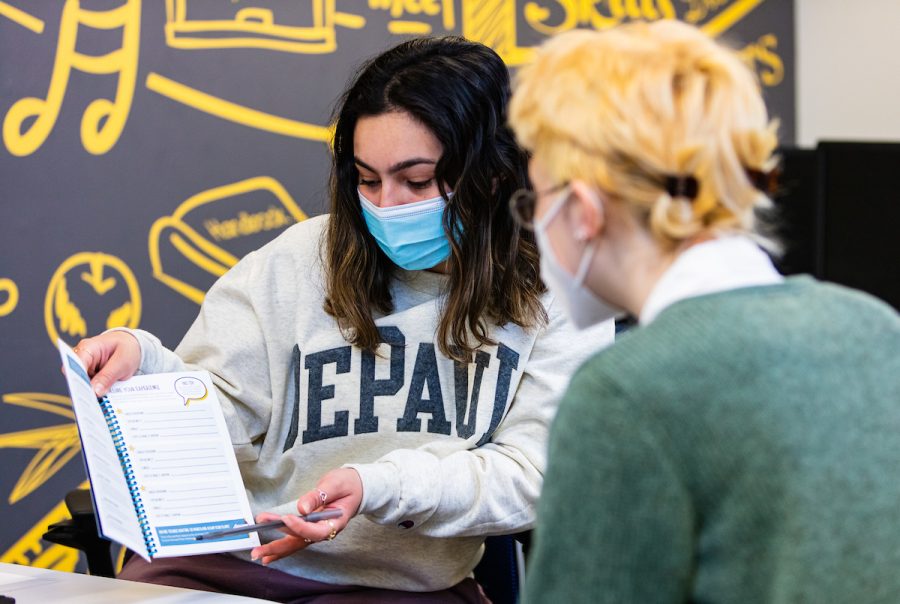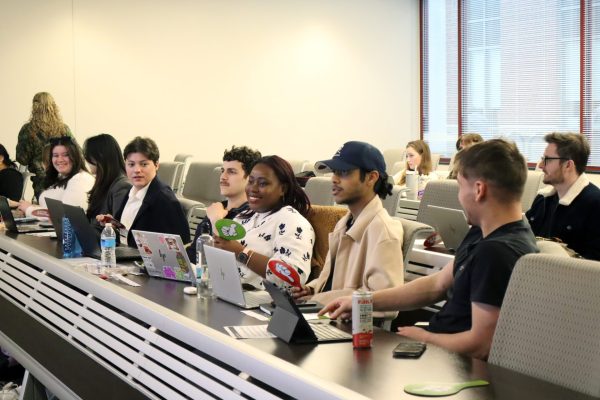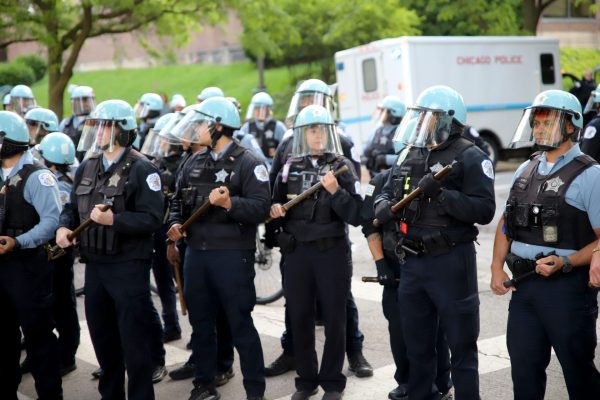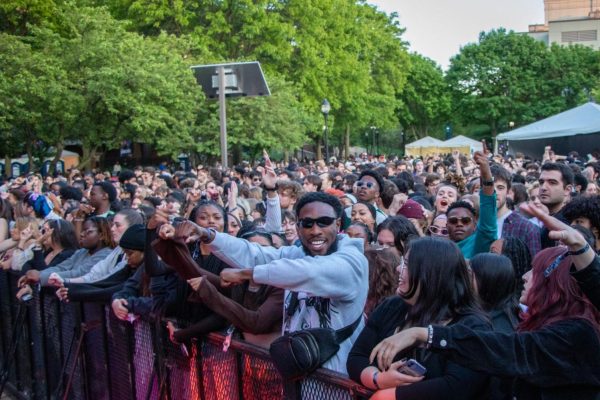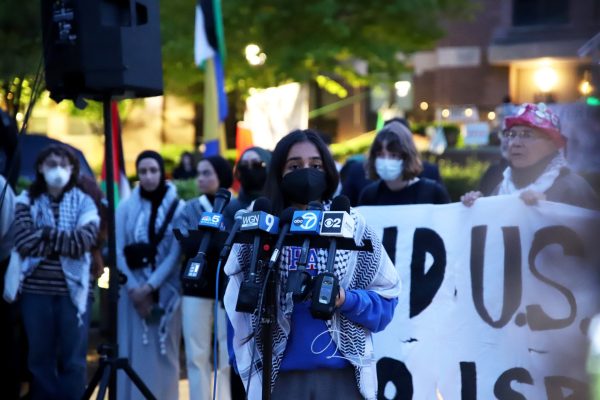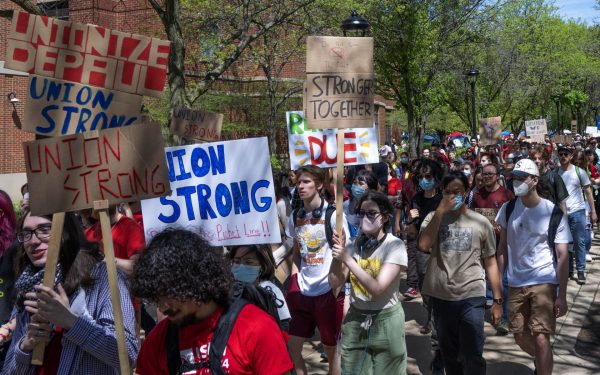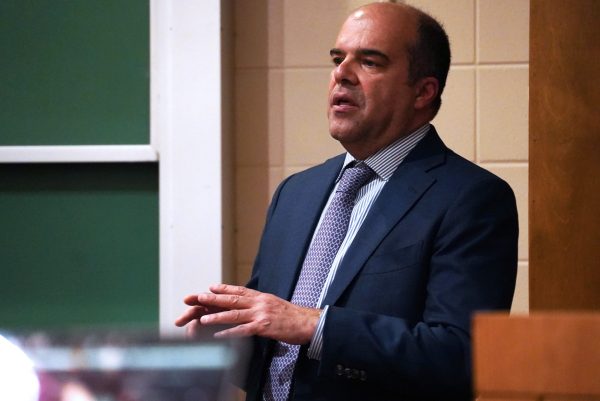EDGE program to end, Future Forward expands to help 1,200 students
DePaul University/ Randall Spriggs
Malak Abuhashish, student mentor in the Career Center’s Future Forward Program, shows a Future Forward Program handbook to a student mentee, Monday, Jan. 24, 2022, in the Schmitt Academic Center on DePaul’s Lincoln Park Campus. (DePaul University/Randall Spriggs)
Since 2011, DePaul’s Education and Development Grant for Employability (EDGE) program has provided students the opportunity to earn more financial aid while also engaging in career development training.
The program offers a select group of first-year students the opportunity to participate in career and job skill development, while working for an assigned department or office team at DePaul.
“I’ve gotten a lot out of it, but mainly just getting involved in the school which I feel is really important your freshman year,” said film and television student, Victoria Rueda, who was a member of EDGE this year.
Now, 12 years later, EDGE will no longer be offered to first-year students for the next academic year.
Brenda Williams, managing director at DePaul’s Career Center, said that while EDGE is ending this year, the hybrid Future Forward program that began three years ago will be offered to any first-year students who are also eligible for EDGE.
“Any students who would have been eligible for EDGE would now have a slot in Future Forward,” Williams said.
She said that while many people on campus believe EDGE is ending due to budgetary constraints, the university has been planning to switch to Future Forward for the last two years.
“The reason why we made the switch or the change is that we had two first year programs that were doing pretty much the same thing,” Williams said. “It was very much a strategic decision to cut some duplication…so that we can give even more students exposure to career readiness and career success in general.”
According to Williams, the decision to continue Future Forward and end EDGE was not an easy one. However, she said they are able to now accept 1,200 students in Future Forward compared to just 250 in EDGE each year.
“Our goal and vision would be that every first year student will be able to do Future Forward, but that takes a lot of resources and money, but we’ve been building slowly,” Williams said.
While Future Forward is not exactly the same as EDGE, the programs have many similarities that will carry into the next academic year.
Like EDGE, Future Forward will still offer eligible first-year students a $3,000 grant, but it will be applied to students’ second-year tuition after they complete the program, instead of the first year, Williams said.
The Future Forward program will also continue EDGE’s goal of preparing first-year students for careers after college. In the program, students will complete online modules and career-readiness activities that will help prepare them for jobs after graduation.
“We’re gonna lose some aspects of EDGE, but what we consider the most important aspects, we’re still retaining, it’s just through a different form,” Williams said.
For Rueda, coming to DePaul from Texas was a huge transition, but EDGE helped her meet new people.
“I didn’t know anyone, and being in EDGE helped me meet a lot of new people and get way more involved in DePaul,” Rueda said.
Like EDGE, Williams said Future Forward will also help students connect and build relationships with people on campus.
Another aspect that will remain the same is students who appeal for more financial aid will be eligible for Future Forward.
Despite the continuation of Future Forward and the grant opportunity for those seeking more financial aid, some students are sad to see EDGE go. Suzan Arab, a political science major at DePaul and EDGE member this past year, said she appreciates that EDGE is an in-person, hands-on program which she believes is an aspect that Future Forward lacks since it is mostly online.
“EDGE is such a hands-on program where you get to become so close to other students and faculty and learn so much,” Arab said. “Future Forward just feels like another class, especially with all the online modules.”
Arab said being in EDGE greatly impacted her experience at DePaul her freshman year.
“It has made my freshman year so much easier,” Arab said. “It’s been around for long enough where we could connect with many students that have been a part of it in the past, it also teaches you a lot of different things on campus.”
For Williams, she believes Future Forward will still be able to offer students a similar experience to the one they would get through EDGE, but on a much larger scale.
“We really saw it as a viable program, and we could expand it,” Williams said. “And so to be able to hit 1,200 students versus just 250, you can’t beat that.”


